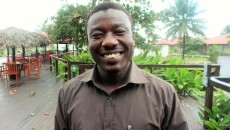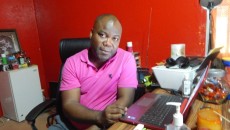The “Liberian Trailblazers” series profiles exceptional Liberians and the work they do. The recent Ebola outbreak exposed the severely crippled state of the health infrastructure in Liberia and exposing a lot of its vulnerabilities. A US-based NGO, Chicago Global Health Alliance has partnered with Northwestern University to help improve the state of the healthcare sector in the country. The Bush Chicken spoke with the Co-Founder and President of the organization, Rev. Kenety Gee, regarding the organization’s current initiatives.
Tell us a little about yourself and your background.
I was born and raised in Liberia, but I’ve lived in the US for about 20 years. I came here as an international student and after graduate school I came to Chicago, Illinois for work. I have a degree in non-profit management and I am pursuing an additional master’s degree in global health. I have many friends in the medical field, and I took one of them with me to Liberia when I visited in 2013. When we saw the medical situation in the country, we decided we were going to take multiple trips and figure out a way to get involved in the country and make systemic change. As a result, we started the Chicago Global Health Alliance while based out of Northwestern University in Chicago. Our goal is to do transformational work that will have a lasting impact on the country in a meaningful way.
What is Chicago Global Health Alliance currently working on?
When we were in Liberia, we noticed the lack of equipment available in hospitals. As a result, many doctors were unable to perform procedures simply because of lack of equipment and supplies. We decided to help support these health facilities by sending them equipment and we have recently sent a shipment of supplies with a value of over US$700,000. Additionally we’ll be sending another shipment of supplies and equipment later in the year with a similar value. Later this year we’ll be traveling to the country with doctors, surgeons, and clinical psychologists to go with us to help support the work that they’ll be doing. When the people in Liberia see skilled volunteer doctors come to the country, it gives them much hope.
The lack of equipment, which creates barriers to people getting healthcare, is also something that we want to eradicate. We also realize that misdiagnosis is common in the country which is very difficult in a country with so many people having very little income to spend on inadequate health services. So some of the equipment we are sending is to help with the high rate of misdiagnosis as well.
Unfortunately, the supplies that are being sent to Liberia include modern biotech equipment, and there are no biomedical technicians there to repair the machines if they stop working. As such, we are also developing a bio-medical technology institute to train people in Liberia on how to service the equipment. Part of what we plan to do on this visit is meet with a local school to see if we can partner with them to create the biotech training programs on their campus. We are also approaching another school to develop a research platform that would partner with Northwestern University’s Feinberg School of Medicine.
What controls does your organization have in place to ensure the resources you are sending to the country are managed properly?
Since I was born and raised in Liberia I am very familiar with the system. What we want to do is get very involved and hands-on. That is why the equipment we are sending is going to be received by myself in Liberia to ensure it reaches the proper destination. We’re sending doctors that will be training people, and the supplies need to get to the appropriate place in time for them to conduct their training. We do not plan to hand money to government officials; we know that government can at times be an obstacle to getting the resources to the target population, and we do not want the government to impede our progress. Liberia and most African countries are such resource-rich countries, but we have cultures in these countries that are barriers to development. We as an organization want to get involved in such a way that these obstacles will not hinder our work, but it will reach the broader population. Our overall goal is figure out what we can do to support the development of Liberians to remove health as an obstacle so that health does not hinder people. Being in a poor country with poor healthcare is a hindrance, and we want to help alleviate some of that problem.
What has been the response from the Liberian government to your program? Roadblocks, support, etc.
We were able to meet with the US Ambassador locally and were promised gratis visas into the country that we just received. We talked to the government of Liberia to permit us to bring the equipment into the country duty-free, and we expect to have our request approved. So far we have not had a hindrance yet, and that is what the strength of our organization is, in my opinion. I firmly believe that it is the citizens of a nation that are the best equipped to do the best work for their country. Aid organizations and other foreign nations are all providing great support to Liberia, but Liberians have to do Liberia’s work. So our collaboration with US citizens with Liberians involved we hope can overcome a lot of the barriers that other organizations experience with regards to providing aid to the country.
Talk a little bit about the training and recruitment of healthcare professionals in Liberia. How are you locating recruits and what has the response been?
When our medical and mental health team goes to Liberia we’ll be working in partnership with the people that are already on the ground. There are going to be formal training and workshops that are taking place but in the meantime we know people need the long-term training that Northwestern will help to support. We’ll also be working to help people complete the process of getting advanced degrees and access into the medical field. To date we have done training at 4 hospitals in Liberia, but we plan to broadcast our work to other healthcare professionals not restricted to the hospitals we’re working with that may be able to register for some of the training classes as well.
Being a pastor, have you been able to galvanize the faith-based community to partner with your organization? If so, how are you working together towards the development of your non-profit?
As a pastor, I realize that while we concentrate on medical work, there are spiritual factors that also need attention in places like Liberia. We know the importance of that. In fact, it is the most important factor that we recognize. There is a spiritual darkness that hangs over the country, so we partner with churches in the US to help us with our work as well as churches in Liberia. We partnered with St. Peter’s Lutheran Church in Monrovia to store some of our supplies as well as help find people that are in need of medical treatment and requiring pro-bono care.
How have Liberians abroad supported your organization and are there specific ways in which we can support CGHA?
Last year we had a fundraiser, and a lot of Liberians attended it. We would like Liberians to visit our website and continue to spread the word about the work we are doing so more people can get involved with the organization. Online they can make donations and if they have skills in the medical or business field, they can offer their services short-term to volunteer and even travel to Liberia to contribute on the ground. We will also be facilitating the travel under our banner for any medical professionals or volunteers to get into the country by helping to mitigate the red tape with some of the government agencies. We will be happy to answer any questions they have. I plan to run the New York marathon and Chicago Marathon this year to help raise funds and bring awareness to our organization.
Where do you see Chicago Global Health Alliance in the next 5 or 10 years?
Our measure of success will be if Liberia’s medical system is strong, that is, if there are more medical doctors available to care for the people. Currently, there are only 39 medical doctors for the entire nation. We know the medical situation in Liberia not only in regards to the lack of supplies but people to administer services as well, and we plan to change that. If we can train more people and in 4 or 5 years, we have at least 100 – 200 doctors in the country, we’ll be able to employ an entrepreneurial model. We’re in a global market and people who are skilled in medicine will be drawn to markets that can pay them commensurate with their skills and experience and that’s one of the matters we are looking at addressing in detail. Long-term, we want to fortify the medical system in Liberia to such a level that Liberians with the means to pay for quality care will not seek healthcare services outside of the country. We will not only be adding to the countries’ local economy, but we will also increase the level of trust people have in the healthcare system. In the future, we want Liberia to be one of the places people come to from abroad to seek quality health care.
This interview was edited for clarity and brevity. Featured image courtesy of chiglobalhealth.com



